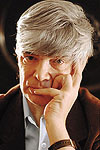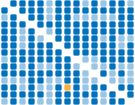The page of Jerofejev, Venedikt Vasziljevics, English biography
Biography
Venedikt Erofeev was born in 1938 in Zapoliar’e, a town which lies in the Murmansk region of Russia. He grew up in Kivrosk, on the northern Kol’skii Peninsula. In 1946, his father was arrested for "the dissemination of anti-Soviet propaganda" and became a prisoner held responsible by the comprehensive and notorious Article 58. His mother found herself unable to take care of three children alone and sent her two boys to a children’s home until 1954, when their father returned home. Despite the misfortune of an unwillingly absent father, Venedikt was an excellent student and received the gold medal for his high academic achievement. However, he was quite rebellious and refused to become an Octobrist, Pioneer, or a member of the Komsomol, organizations which were not denied at this time in the Soviet Union. Perhaps this behavior was caused by his father’s opinions voiced before his arrest, or was a result of his opinions formed after the arrest itself. In 1955, he was accepted into the Philological Department of the Moscow State University and traveled for the first time below the Arctic Circle.Erofeev was expelled after three semesters at MGU because of his, "sufficiently unconventional and erratic" behavior. However, not wanting to leave the Moscow area, he attended other schools in order to keep his status as a student. At the Vladimir Institute, one of these such schools, Erofeev met his first wife, Valentina Zimakova. They separated soon after the birth of their son in 1966, but his love for the child made him travel frequently to visit Zimakova’s home in Myshlino, near Petushki. Throughout this period of the 1960s and 1970s, Erofeev was employed in a variety of basic positions, such as a glassware inspector, stoker, watchman, and construction worker. He travelled throughout the Soviet Union laying telephone cable from 1964 to 1969. In the period following this, 1969 to 1974, Erofeev wrote his best known work Mokva-Petushki (translated as Moscow to the End of the Line) and worked as a telephone repairman in Moscow.
After 1974, Erofeev began working in biological research. It was during this period that he married his second wife, Galina Erofeeva, who helped to promote the publication of his manuscripts, both under the Soviet regime and during the glasnost years. Although it was only possible to circulate his work in typewritten manuscripts during Communism, Erofeev was able to see his writings published in Russia in the late 1980s and receive publicized praise for his prose. Since his death of throat cancer on May 11, 1990, he has accumulated a significant and solid reputation in literature.




